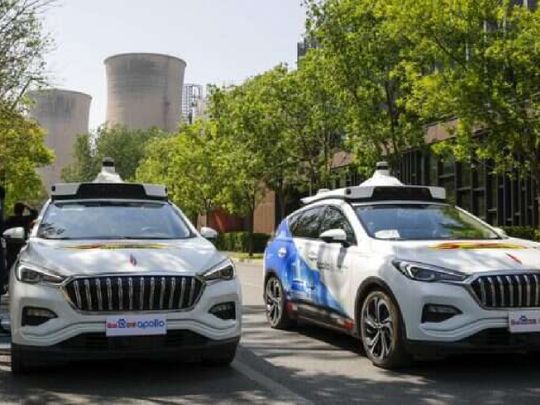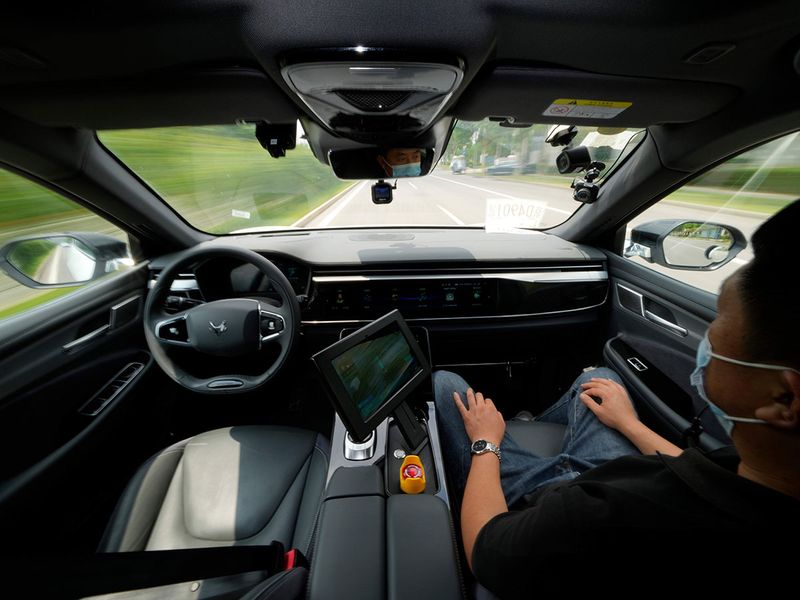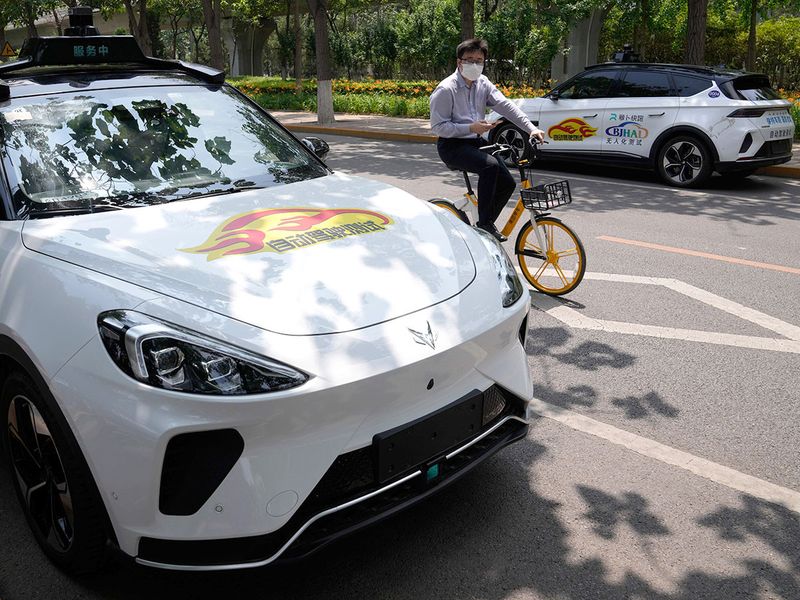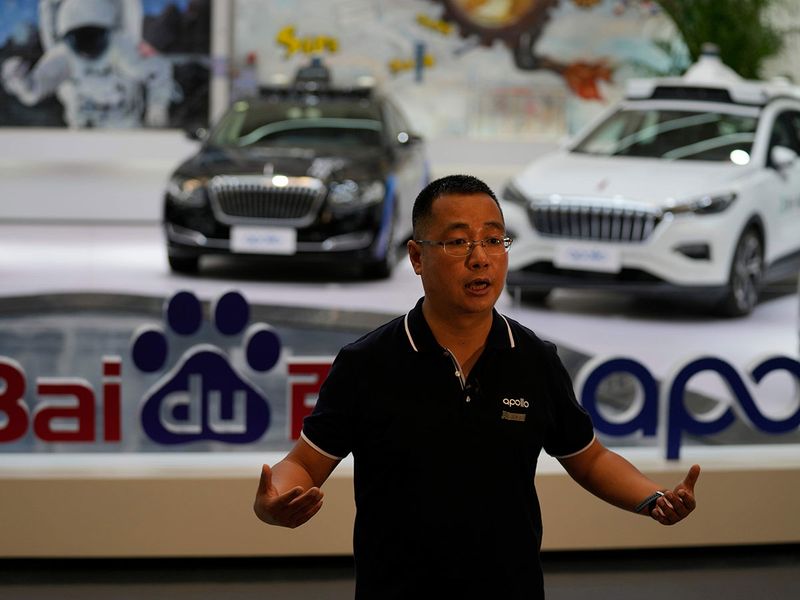
Beijing: Baidu, the owner of China's largest search engine, saw a 65 per cent increase in the number of driverless taxi services it provided in the third quarter of this year, indicating that the world's largest market for electric vehicles (EVs) is embracing autonomous driving, the company said in a statement.
The Apollo Go robotaxi business of Beijing-based Baidu, which has invested heavily in artificial intelligence recently, reported on Tuesday that 474,000 rides were completed between July and September, up from 287,000 journeys in the prior quarter.
Rides up by 311%
The number of rides increased by 311 per cent year over year in the third quarter. In the first-tier cities of Beijing, Shanghai, and Guangzhou, each autonomous cab performed 15 trips daily.

“We believe that our strong and improving safety track record in autonomously transporting passengers on public roads provides a strong endorsement for more cities to issue permits for fully driverless ride hailing,” the company said in a statement.
Driverless taxi licenses issued
Baidu is China's highest-profile competitor in a multibillion-dollar race with rival autonomous vehicle developers including Alphabet Inc.'s Waymo and General Motors Co.'s Cruise to turn their futuristic tech into a consumer product.
In China, robotaxi services are currently being led by two companies, namely Baidumand Pony AI. In a designated zone covering 60 square kilometers in Beijing, Baidu and Pony AI became the first two mainland operators to be permitted to charge customers using their driverless taxis last November.
Baidu, which has invested heavily in AI recently, owns the largest search engine in China. The growth shows autonomous driving is gaining ground in the largest market for electric vehicles (EVs) in the world.
Its Apollo Go robotaxi logged 287,000 rides in the previous quarter, and completed 474,000 journeys between July and September, the company reported.
Baidu and a rival, Pony.ai, received China's first licenses in April to operate taxis with no one in the driver's seat but with a safety supervisor on board. That came 18 months after Waymo started driverless ride-hailing service in Phoenix, Arizona, in October 2020.
Founded in 2000 as a search engine operator, Baidu has expanded into artificial intelligence, processor chips and other technology. It says its autonomous vehicles could, if successful, make driving cheaper, easier and safer.
Reducing accidents
"We believe the top goal of autonomous driving is to reduce human-caused traffic accidents,'' said Wei Dong, vice president of Baidu's Intelligent Driving Group.
Autonomous driving is one of an array of emerging technologies from artificial intelligence to renewable energy that China companies are pouring billions of dollars into trying to create, urged on by the ruling Communist Party.
Beijing wants to join the United States, Europe and Japan in the ranks of technology powers to build its prosperity and global influence. That holds out the possibility of new inventions but also fuels tension with Washington and its allies, which see China as a strategic challenger.

Baidu's Apollo autonomous driving platform was launched in 2017 and the Apollo Go self-driving taxi service three years later.
Taxi service with a driver at the wheel to take over in an emergency started in 2020 and has expanded to Beijing, Shanghai and eight other cities. Apollo Go says it provided 213,000 rides in the final quarter of last year, making it the world's busiest self-driving taxi service.
For rides with no driver and a supervisor in the passenger seat, Apollo Go started in a 60-square-kilometer (23-square-kilometer) area of Yizhuang, an industrial district on Beijing's southeastern outskirts with wide streets and few cyclists or pedestrians.
"It's very convenient,'' said Zhao Hui, 43, who uses Baidu taxis in Yizhuang. "It might feel a little safer'' than a human driver, Zhao said. "Sometime there are small objects, maybe some that people don't notice. They can spot them and stop.''
Other developers
Other developers include Deeproute.ai and AutoX in Shenzhen. Pony.ai, founded in 2016 and backed by venture capital, is road-testing autonomous cars and semi-trailer trucks. Industry plans are "very aggressive to deliver the robo-taxi to the consumer,'' said Owen Chen of S&P Global Mobility.
Automaker Geely, owner of Volvo Car, Geely, Lotus and Polestar, has announced plans for satellite-linked autonomous vehicles. Network equipment maker Huawei Technologies Ltd. is working on self-driving mining and industrial vehicles.
"People are very expensive,'' said Wei. "Once this public service no longer needs people, the cost can drop rapidly.''
As for whether China can lead the global industry, "it's a race at the moment,'' said Pete Kelly, managing director of the automotive division of GlobalData Plc.
"But they could easily do this, because of the way decisions are made and deployments happen in China,'' Kelly said.
McKinsey & Co. in 2019 estimated China's potential market for self-driving taxis, buses, trucks and other equipment and software in the trillions of dollars. The earliest products are unlikely to earn back their development costs but might be "loss leaders'' to sell other services, said Kelly.
Baidu says it already is selling navigation and other technology to automakers. It projects total sales of 10 billion yuan ($1.5 billion) based on agreements made so far, chairman Robin Li said in a May 26 conference call with reporters.
The company said it spent a total of 24.9 billion yuan ($3.9 billion) on research and development. Baidu reported a profit of 10.2 billion yuan ($1.7 billion) last year on 124.5 billion yuan ($19.5 billion) in revenue.
Level 4 autonomy
Baidu and its most advanced rivals have reached the industry's Level 4 out of five possible levels of technology. That means their systems can operate without a driver but must be pre-loaded with a detailed map. That limits the area where they can operate.
Lower levels of technology range from cruise control, a feature available for decades, up to Level 3, which allows hands-free highway driving. Self-driving robot carts already are widely used in factories, warehouses and other tightly controlled settings.
Once self-driving taxis are on the road, operators must gather information about pedestrians and local conditions based on daily driving, a time-intensive process that will slow the technology's rollout.
For a maneuver such as a U-turn, the Apollo system tracks as many as 200 vehicles, pedestrians and other potential obstacles as much as 100 meters (110 yards) away, according to Baidu.

Wei said Baidu would be happy to have foreign partners adapt its technology to their markets but has no export plans yet while it focuses on Chinese cities.
Intersections still are a challenge, Wei said. Pedestrians in China are used to drivers gradually making their way through crowds in a crosswalk while turning on a green light, but a robot car can't do that.
"Our car always will yield to people and might wind up not getting through the light,'' Wei said.
Baidu has launched its own self-driving car brand, JIDU, which unveiled a concept car this month. Li said the company will target the market for family vehicles priced above 200,000 yuan ($30,000).
The company also has deals with three Chinese electric vehicle brands to produce cars with computers, radar and light-based sensors built in instead of bolted onto the roof. Baidu says it aims for a sticker price of 480,000 yuan ($72,000) for its latest generation of taxis.
To encourage others to use Apollo, Baidu has made the platform open-source and says it has signed up 210 industry partners and 80,000 developers who might create products based on it.
Apollo Go says it plans to expand self-driving taxi service to 65 cities by 2025 and 100 by 2030.
Compared with a human driver, "the difference isn't big,'' said Zhang Zhihua, 29, an interior designer who uses driverless Baidu taxis in Yizhuang. "If you aren't looking at the front and if you are playing on your mobile phone, then it feels exactly the same.''











